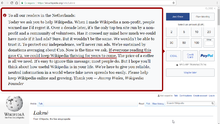Geotargeting is a method employed to provide customized content or ads to users based on their geographic location. This location data can be gleaned from the user’s shared details or by tracking their IP address. Renowned companies such as Ace Hardware, FedEx, and UPS utilize geotargeting to offer location-specific content like nearby store locations or services unique to a region. It is also a tool used in Search Engine Optimization (SEO), where a technique called cloaking is used to match a visitor’s IP with the list of IPs from the search engine server. Geotargeting boasts a range of uses, from content localization for international domains to targeted advertising[1] and fraud prevention. However, its use has sparked discussions among SEO professionals and raised concerns over privacy.
In geomarketing and internet marketing, geotargeting is the method of delivering different content to visitors based on their geolocation. This includes country, region/state, city, metro code/zip code, organization, IP address, ISP, or other criteria. A common usage of geotargeting is found in online advertising, as well as internet television with sites such as iPlayer and Hulu. In these circumstances, content is often restricted to users geolocated in specific countries; this approach serves as a means of implementing digital rights management. Use of proxy servers and virtual private networks may give a false location.

